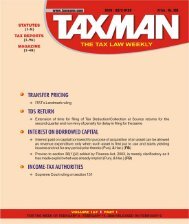news round up - Taxmann
news round up - Taxmann
news round up - Taxmann
- TAGS
- news
- round
- taxmann
- taxmann.com
You also want an ePaper? Increase the reach of your titles
YUMPU automatically turns print PDFs into web optimized ePapers that Google loves.
124 GOODS & SERVICES TAX - MAGAZINE [Vol. 1<br />
sale or purchase of goods whereas the States can levy tax on sale of goods<br />
only.<br />
The present system has grown into a complex tax structure involving<br />
multiple authorities. And in order to provide a transparent system for<br />
operational ease, the reform process that has been initiated long back has<br />
emerged for the introduction of a new system.<br />
Proposed GST<br />
3. The Empowered Committee of State Finance Ministers on November<br />
10, 2009 unveiled the contours of the proposed GST in its ‘First Discussion<br />
Paper on Goods and Services Tax in India’. The paper elaborates the<br />
system of dual GST, the manner of its application, its coverage besides<br />
containing details on several aspects of the tax.<br />
The GST to be introduced would have dual GST system as decided by the<br />
Government with two components Central GST (CGST) and a State<br />
GST(SGST) simultaneously levied by Centre and State, respectively, on all<br />
transactions of ‘goods and services’ with exception to those provided for<br />
by law.<br />
The paper also mentions that GST would subsume<br />
(a) the Central taxes - Central excise duty, additional excise duties, the<br />
excise duty levied under the Medicinal and Toiletries Preparation<br />
Act, service tax, additional customs duty or countervailing duty,<br />
special additional duty of customs on imports, surcharges, and cess,<br />
Central sales tax and service tax.<br />
(b) the States taxes - VAT/Sales tax, entertainment tax (unless it is levied<br />
by the local bodies), luxury tax, Taxes on lottery, betting and gambling,<br />
State cess and surcharges, entry tax/octroi.<br />
Constitutional Amendment - A necessity<br />
4. The launch of the new system requires preparation and constitutional<br />
amendment is one of the few important and emergent needs for smooth<br />
rollout. It is considered necessary because with GST in place, there would<br />
be an unified tax-‘tax on goods and services’ and the discrete jurisdiction<br />
of the Centre and States to levy tax would ipso facto merge, which the<br />
Constitution does not provide for.<br />
To explain, the Constitution provides for delineation of power to tax<br />
between the Centre and States. While the Centre is empowered to tax<br />
services and goods <strong>up</strong> to the production stage, the States have the power<br />
to tax sale of goods. The States do not have the powers to levy a tax on<br />
s<strong>up</strong>ply of services while the Centre does not have power to levy tax on the<br />
sale of goods. Thus, the Constitution does not vest express power either in<br />
the Central or State Government to levy a tax on the ‘s<strong>up</strong>ply of goods and<br />
services’. Moreover, the Constitution also does not empower the States to<br />
impose tax on imports. Therefore, it is essential to have constitutional<br />
GOODS & SERVICES TAX CASES ❑ JANUARY 20 - FEBRUARY 4, 2010 ◆ 34











![“FORM NO. 3CEB [See rule 10E] Report from an ... - Taxmann](https://img.yumpu.com/45480232/1/190x245/form-no-3ceb-see-rule-10e-report-from-an-taxmann.jpg?quality=85)





